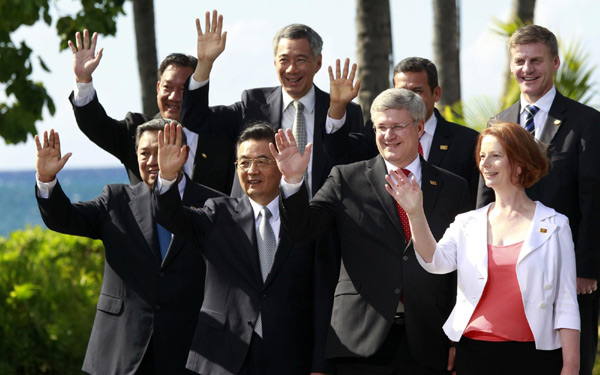|

APEC leaders wave during their official family photo in Honolulu, Hawaii, November 13, 2011. The leaders are (front row, L-R) Indonesian President Susilo Bambang Yudhoyono, China's President Hu Jintao, Canadian Prime Minister Stephen Harper and Australian Prime Minister Julia Gillard, (back row L-R), Thailand's Deputy Prime Minister Chalerm Yubamrung, Singapore Prime Minister Lee Hsien Loong, Peru President Ollanta Humala, and New Zealand Deputy Prime Minister Bill English. [Photo/Agencies]
Chinese President Hu Jintao on Sunday called for Asia-Pacific Economic Cooperation (APEC) members to continue to promote global trade and investment liberalization as European countries are grappling with a debt crisis that might drag the world into another recession.
Hu made the appeal while delivering a speech at the 19th APEC Economic Leaders' Meeting in Hawaii, the United States.
"Protectionism in various forms is on a notable increase," Hu noted, adding that trade protectionism is one of the factors that cause instability and uncertainty to the global economic recovery.
"Opening-up in trade and investment is crucial to economic recovery. We should fully honor the commitments already made, avoid new trade protectionist measures, firmly oppose and jointly resist protectionism of all forms, and work to establish a balanced, inclusive and win-win multilateral trading regime," Hu said.
As a staunch supporter of global trade and investment liberalization, China has become one of the most open markets in the world, Hu said.
Over the past 20 years, China has opened further and wider to the world, with its trade and two-way investment increasing rapidly and its open economy growing in an all-round way.
From 1991 to 2010, China's total volume of imports and exports grew from $135.7 billion to nearly $3 trillion at an average annual rate of 17.6 percent.
Over the same period, foreign direct investment in China grew from $4.37 billion to $105.74 billion at an average annual rate of 18.3 percent.
China's overall tariff level also dropped from 42.5 percent to 9.8 percent.
China has announced its decision to apply zero tariff to 97 percent of the tariff items of the country's imports from the least developed countries having diplomatic relations with China, Hu said.
"We should actively promote trade and investment liberalization and facilitation in the Asia-Pacific and deepen regional economic integration so as to create impetus for the sustainable economic recovery and growth of the Asia-Pacific region," he added.
"China will continue to implement a win-win strategy of opening-up and make it work even better. We will encourage both import and export and both inbound and outbound investment," Hu concluded. |